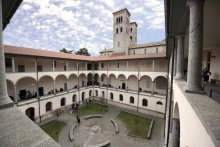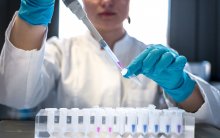Ph.D Course
Restricted access
3 years
Varese
Italian
DIPARTIMENTO DI BIOTECNOLOGIE E SCIENZE DELLA VITA
Course description
This PhD program represents an educational and research proposal of “innovative courses” based on an interdisciplinary approach to the issues related to life sciences. The PhD course aims to face with basic research issues with a biotechnological approach, by using different model systems in the biology, biomedicine and (bio)chemistry fields.
The activities have been planned to train a professional figure able to participate to both academic and industrial research activities, highly qualified and skilled to perform scientific investigations, to analyze and evaluate experimental results, to propose and verify scientific hypotheses, to organize and plan a research project, and to communicate the obtained results incisively.
The course aims to prepare PhDs in fundamental fields of life sciences where they can interact and integrate skills arising from basic knowledge in biological, cellular and molecular processes and from industrial and applied biomedical aspects. The vastness of the topics addressed (a peculiar feature of the biotechnology field) requires the definition of training courses partially common to all PhD students, which differentiate during the development of the proposed research projects under the supervision of the PhD mentor. The proposed path is therefore aimed to foster the specificity of scientific profiles through a multidisciplinary and varied offer of training activities, without providing for the rigid organization in curricula.
One main goal of the PhD Course is to reach a high level of internationalization through the involvement in the teaching and research activities of foreign teachers: we strongly encourage PhD students to spend a research period abroad (at least 3 months) and to actively participate to joined international projects.
What you need to know
An application can be submitted by Italian and foreign citizens who have completed or are completing their graduate studies.
Graduate qualifications accepted: all. Graduate qualifications (Master's degree) most related to the aims of the PhD course: Biotechnology; Medicine and surgery; Dentistry; Veterinary medicine; Communication sciences; Bio-sciences; Pharmacy; Psychology; Chemistry and Pharmaceutical technologies; Physics; Environmental Sciences; Engineering; Agricultural Sciences; Food Sciences; Zoo-techniques.
The candidates can choose to be interviewed either in English or Italian.
Enrollment
You can enroll after a public competition based on qualifications and an oral examination. Please see:
Class attendance
The teaching activities (both mandatory and optional) associated with each single year of the Course are proposed annually by the PhD School Board and are published on the PhD Course website.
Biostatistics
primo anno Course: Biostatistics
Teacher: Giorgio Binelli
Length: 2.5 CFU (20 hours)
Objective:
All fields of modern biology cannot be successfully approached without a knowledge of their statistical and biometrical aspects. It is thus necessary to provide the student with interlaced biological and statistical knowledge. The goal of this course is to make the students familiar with the statistical theory and terminology, so to understand the power and pitfalls of statistical analysis, with special emphasis on the planning of the experiments and the analysis of experimental data in the field of Life Sciences.
Course topics
Basics of statistical analysis
- Why use Statistics. Populations and samples. Basics of probability. Random variables.
- Frequency distributions; what is a statistical test: power and protection of a test, Type I and Type II errors. The most common statistical tests
- Quantitative and qualitative variables – which test?
- Some uses of the z variable.
- The χ2 test. Goodness-of-fit test and comparisons between proportions.
- The General Linear Model (GLM)
- Some uses of Student’s t
- Other statistical tests
- The model of Analysis of Variance (ANOVA).
- One-Way ANOVA: the completely randomised and the randomised block designs.
- Two-way ANOVA.
- Linear regression and correlation models, parameters estimate in linear, multiple and curvilinear regression.
Trends in Biomolecular Sciences
primo anno Course: Trends in Biomolecular Science
Teacher: shared among members of the PhD course
Length: 2.5 CFU (20 hours)
Objective:
Biomolecular science is a research area that profits from a strong multidisciplinary expertise on genetics, microbiology, molecular and cell biology, structural biology, biochemistry, synthetic and systems biology, etc. This course is aimed to provide advanced and updated knowledge through a theoretical and practical training oriented to provide the required skills for supporting the students in their biotechnological research projects (in the different fields of application).
Course topics
Over the years, the course will focus on most recent trends in molecular and cell biology related to:
- Analytical methods
- Advanced cell biology
- Advanced cell biochemistry
- Biopharmaceuticals: from concept to production
- Biomolecules
- Biotransformation and biocatalysis
- Experimental design and research methodology
- Molecular genetics
- Molecular microbiology
- Molecular system biology
Bioinformatics
secondo anno Course: Bioinformatics
Teacher: Gianluca Molla
Length: 2.5 CFU (20 hours)
Objective:
Provide student with practical knowledge of the main bioinformatic processes used in protein investigation. All lessons will be held at the computer, in an informatics class. Most of procedures shown will be performed by the students themselves under the supervision of the teacher. Results will be discussed in a critical manner.
Course topics
The course will cover the main topics of the bioinformatics approach to the study of the structure/properties of the proteins. In details:
- The format of structural data and structural databases (PDB files, RCSB, PDBeChem, ...) and how to search and retrieve structural information
- Basis of visualization of 3D structures and software for macromolecule visualization (PyMol, VMD, ...)
- Prediction of structural properties of proteins (secondary structure, transmembrane regions, signal peptides, ...)
- Discover the evolutionary history of a protein: build a phylogenetic tree, detect the most conserved positions and predict the sequence of ancestral proteins
- Construction of models of the 3D structure of a protein (ab initio modelling, homology modelling)
- Build models of variants in vitro - foldX - ProSAR
- Prediction of binding of small ligands (e.g., drugs) to proteins by Automated Molecular Docking
- Prediction of quaternary structure haddock, Z-DOCK
- Simulation of protein flexibility in solution: The Molecular Dynamics approach
Trends in Biomedical Sciences
secondo anno Course: Trends in Biomedical Sciences
Teacher: shared among members of the PhD course
Length: 2.5 CFU (20 hours)
Objective:
This course is aimed to provide advanced knowledge on the cellular and molecular bases of pathological processes, on the more recent diagnostic procedures and therapeutic intervention modes using a multi-scale approach (from the molecule to the bed of the patient). The acquired knowledge (on metabolic processes, methodologies and analytical tools) will enable students to perform physiological and pathological studies, as well as to develop novel diagnostic and therapeutic approaches.
Course topics
The course is intended to provide advanced theoretical knowledge in the continuously growing areas of biology applied to biomedical sciences and clinical research. In details:
- Advanced clinical pathology
- Advanced techniques in bioimaging
- Advanced treatments in neurodegenerative disorders
- Biomedical engineering and biomaterials
- Cell therapy
- Omics in biomedical science
- Molecular oncology
- Vascular diseases – diagnosis, therapeutic approaches and interventions
Transversal skills
primo anno
secondo anno
terzo anno Course: Transversal skills
Teacher: shared among members of the PhD course and external professionals
Length: 2.5 CFU (20 hours)
Objective:
Despite the undisputable value of specialized skills, the transversal ones represent a main key to professional success, according to some scientific studies. Transversal or soft skills pertain to cognitive, creative, managerial, relational and communication areas. Not only they represent the “most wanted” competences indicated by the corporate sector, but they are also essential life skills. Acquiring these skills provides students with the basic knowledge, abilities and qualities required to translate competences into suitable behavior for organizational purposes and for their professional evolution and success.
Course topics
The course will provide students transversal skills. The course is organized in three modules, provided in different years:
- Module A: Information Literacy; Digital Literacy, Doctoral thesis and copyright; Open access; Collecting and processing information
- Module B: Presentation skills; Problem solving; Results dissertation
- Module C: Economy; Project Management; Patents & trade marks; European research programs
For information
Address: c/o Dipartimento di Biotecnologie e Scienze della Vita - DBSV
Università degli Studi dell'Insubria
Via Dunant, 3 - 21100 Varese - Italy
Coordinator: Professor Silvia Sacchi
Contacts: silvia.sacchi@uninsubria.it





